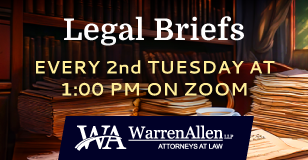An initial question a community owner might have is, "How about my pre-existing community, does it need to comply with ADA issues?" Answer: "It depends." If your community pre-dates the ADA statute, and the community has not gone through any significant renovations (determined on a case-by-case basis), then the community may be "grandfathered in" in most cases. However, there can still be considerations of "reasonable accommodation" and "readily achievable barrier removal" under the ADA that could require a community owner to make modifications to existing structures and to make existing buildings "accessible" to the disabled. There may be no "grandfathering in" under these provisions of the ADA. In addition, if the community has undergone substantial alterations/renovations, this could also trigger ADA compliance.
The next question is whether a manufactured home community is a "place of public accommodation." The ADA defines a "public accommodation" to be "a private entity that owns, leases (or leases to), or operates a place of public accommodation." Examples of places of "public accommodation" include: places of lodging; establishments serving food or drink; places of exhibition or entertainment; places of public gathering; sales or rental establishments; service establishments; stations used for public transportation; places of public display or collection; places of public recreation; places of public education; social service center establishments; and places of exercise or recreation.
Does a manufactured home community fit under these descriptions? Based on discussions with ADA experts, the typical community does not appear to "fit" under any of the enumerated examples of a "public accommodation," assuming the community's facilities are only open for the sole use and enjoyment of the community's residents, rather than the "general public." In some cases, however, a community's clubhouse and office could be determined to be "public accommodations" as they are generally "opened to the public." In addition, the community's office is necessarily "opened to the public" as persons, not otherwise residents of the community, are allowed in and, in fact, are invited in to inquire about available spaces and/or homes in the community.
If the community has "public accommodations" which have "barriers" to "handicap access," then the next consideration is whether the "removal of the barrier" is "readily achievable." The ADA generally defines "readily achievable" as easily accomplished and able to be carried out without much difficulty or expense. 42 U.S.C.S. _ 12181(9). Federal courts have developed several factors in determining what is "readily achievable": (1) nature and cost of the removal; (2) overall financial resources of the facility or facilities involved; (3) number of persons employed at such facility; (4) effect on expenses and resources; (5) impact of such action upon the operation of the facility; (6) overall financial resources of the covered entity; (7) overall size of the business of a covered entity with respect to the number of its employees; (8) the number, type, and location of its facilities; (9) type of operation or operations of the covered entity, including composition, structure, and functions of the workforce of such entity; and (10) geographic separateness, administrative or fiscal relationship of the facility or facilities in question to the covered entity. Colorado Cross Disability Coalition v. Hermanson Family Ltd. Pshp. The community however will bear the ultimate burden to prove that the barrier removal is not readily achievable. This will be determined on a case-by-case basis for each individual community.
So, how do you lessen the chance of your Community becoming a "target" of an ADA lawsuit? There are no "bright lines" as to whether a community has ADA issues or not. Since an "ounce of prevention is worth a pound of cure," the prudent community owner might be best served by hiring a knowledgeable ADA Consultant to review and comment on whether the community has any ADA issues and how they should or could be addressed. Another, and more conservative approach would be to simply make sure that all of the community facilities are "ADA compliant," even if, technically and legally, you may not be required to do so. Little things can make a big difference in your community. Examples of ADA compliance include: levers on the entrance doors; levers on bathroom doors and fixtures; bathroom fixtures at proper height; proper bathroom accessories; doorways that accept wheelchair access; bathrooms that accept wheelchair access; counters at correct height for wheelchairs users; alternatives (ramps/elevators) to steps into the clubhouse and office; acceptable transitions (no lips) at doorways (interior and exterior); handicap community and van access; acceptable transitions (commonly referred to as "curb cuts") to sidewalks at street junctions and handicap community; and acceptable inclines from community areas to public accommodations, to name a few.
Your ADA consultant can walk your community and let you know what facilities do and do not comply with ADA. Making the necessary improvements will be money well spent, and potentially "ward off" expensive litigation, which litigation, in all probability, will not be covered by your general liability insurance policy. You might also want to turn this into a "PR plus" for your community - i.e., tell your residents about the improvements after they are done! However, such actions may not be right for every community. The community owner should first discuss ADA considerations with its legal counsel to determine what the right course of action under the particular circumstances.
Rob Coldren is a founding partner of the MHI-member law firm of Hart, King & Coldren in Santa Ana, Calif. For over three decades, Mr. Coldren's practice has emphasized representation of mobilehome parks, recreational vehicle parks, as well as park owners and managers. He can be reached at rcoldren@hkclaw.com. John Pentecost is a partner with the firm and specializes in property rights and the law as it pertains to the manufactured housing industry. He may be reached at jpentecost@hkclaw.com. Both can be reached by phone at (714) 432-8700.

